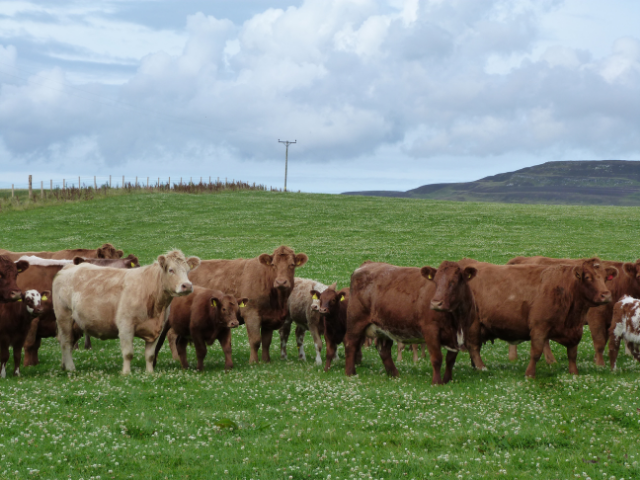Orkney declared BVD-free
Date: 15 March 2022

Cattle farmers in the county are celebrating the news that their herds have been declared free of Bovine Viral Diarrhoea (BVD).
The office of Scotland’s Chief Vet, Sheila Voas, has confirmed that Government records show the last Orkney animal infected with BVD, was removed on
4 March 2020 – resulting in Orkney being clear of BVD for two years.
Widespread throughout the world, BVD is regarded by vets as the most significant cattle disease in Europe and North America.
If the foetus of non-immune in calf females is infected, possible consequences include abortion, infertility, reduced milk yield and still-born or deformed calves.
Live Persistently Infective (PI) calves are incurable super virus spreaders.
The virus can also suppress the immune system of other cattle in the herd, reducing their resistance to numerous serious and costly health challenges.
Orkney’s 550 cattle farmers keep 28,000 breeding cows on 247,000 acres (100,000 has), representing the highest density of beef cattle in Europe. In addition, the 16 dairy herds make Orkney the largest dairy field north of Stirling. Cattle have long been an important cornerstone of the Orkney economy.
Over 20 years ago, a small group of Orkney farmers, along with a local vet and the Scottish Agricultural College (SAC) veterinary laboratory in Thurso, designed a scheme to eradicate BVD from Orkney.
By adapting the Cattle Health Certification Standards (CHeCS), they created a scheme which was workable within Orkney cattle systems.
The Orkney Livestock Association (OLA), with the target of eradicating BVD, was launched 1 February 2001, with a financial kick start of £500,000 from Orkney Islands Council to cover laboratory costs of initial blood tests.
In the first two years of the OLA scheme, a total of 378 PI cattle were identified and removed, significantly reducing the cycle of infection.
By spring 2007, well over 80% of Orkney herds had achieved BVD Accredited Status (earned after two consecutive clear annual blood test screens). Herd health improvement was resulting in Orkney farmers rearing more and bigger calves from the same number of cows.
Six years into the scheme, figures from the Orkney SAC office showed profits for some farms, had increased by up to 30% since 2001. While on average herds were weaning between three and four extra calves a year – resulting in a total of 1,500 to 2,000 additional head of cattle per annum for the Orkney economy.
Current OLA Chairman, David Scarth, who farms 100 commercial and 50 pedigree beef Shorthorn cows at Twatt Farm in Birsay said: “the achievement of BVD Clear status is the result of a joint effort over more than two decades, not only by the cattle farmers and vets, but all involved in the Orkney cattle industry, for which we are very grateful.
“The letter we recently received from the Scottish Government confirming Orkney has been clear of BVD for two years, included praise for OLA ‘s successful BVD control in Orkney, which ‘has served as a model for the rest of Scotland’s cattle keepers’.
“Orkney is proud to give assurance to our cattle buying customers, who travel across the Pentland Firth, that every beast on offer is definitely free of BVD.”
Mr Scarth added: “Of course, we can’t be complacent, in the past we’ve learnt how easy it is to unintentionally re-introduce BVD, so strict bio-security and monitoring of any cattle brought into Orkney, will continue.”
- Summary:
Cattle farmers in the county are celebrating the news that their herds have been declared free of Bovine Viral Diarrhoea (BVD).
The office of Scotland’s Chief Vet, Sheila Voas, has confirmed that Government records show the last Orkney animal infected with BVD, was removed on
4 March 2020 – resulting in Orkney being clear of BVD for two years.
- Category:Environmental Health
- External Link:

